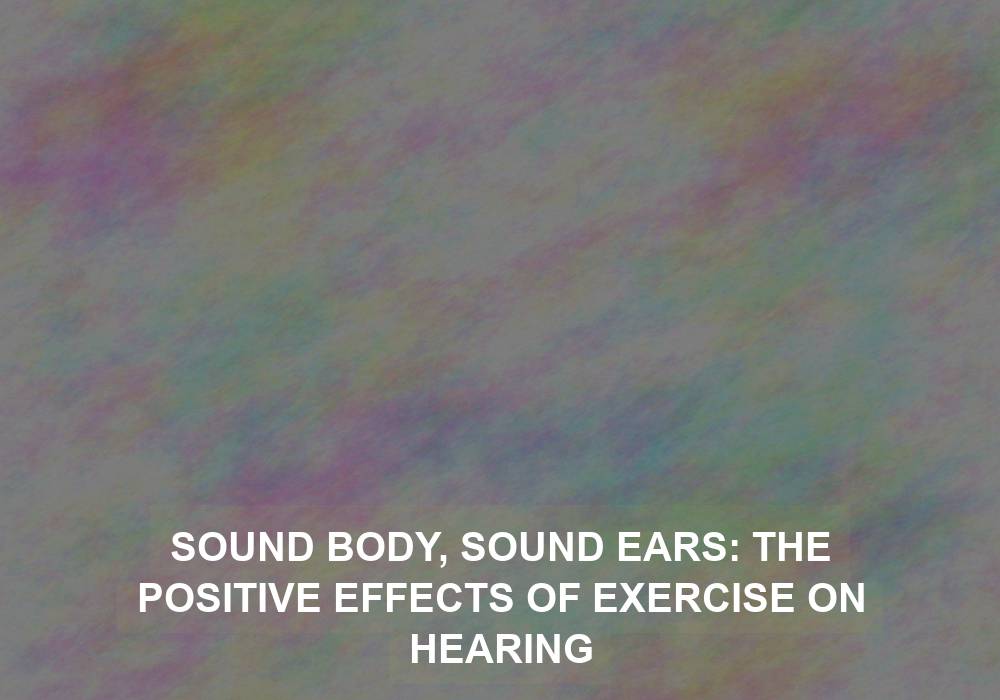In today’s fast-paced world, prioritizing our health is crucial for maintaining a high quality of life. While exercise is often associated with physical fitness and weight management, it also plays a significant role in promoting good overall health, including the well-being of our auditory system. This article will explore the positive effects of exercise on hearing and why it is crucial to include regular physical activity as part of your daily routine.
The Link Between Exercise and Hearing
Before delving into the specific benefits of exercise on hearing, it is essential to understand the connection between these two aspects of our well-being. Our auditory system consists of delicate structures, including the inner ear, which require proper blood circulation and oxygen supply to function optimally. Regular exercise improves cardiovascular health, increasing blood flow throughout the body, including the ears.
Here are some key points to consider:
- Adequate blood flow ensures that the auditory system receives the necessary nutrients and oxygen for optimal performance.
- Exercise stimulates the release of endorphins, which can alleviate stress and anxiety – factors that have been linked to hearing loss and tinnitus.
Enhancing Blood Circulation
One of the key benefits of exercise is its ability to enhance blood circulation. By engaging in cardiovascular activities such as running, swimming, or cycling, you promote the efficient delivery of oxygen and nutrients to all parts of your body, including your ears. This increased blood flow helps to nourish the delicate hair cells within the cochlea, which are responsible for translating sound vibrations into electrical signals that can be processed by the brain.
Here are some additional points to consider:
- Improved blood circulation through exercise ensures that the hair cells in the cochlea receive the necessary oxygen and nutrients for optimal function.
- The nourishment of these hair cells enhances their ability to accurately transmit sound signals to the brain, resulting in improved hearing capabilities.
Reducing the Risk of Age-Related Hearing Loss
As we age, it is natural for our hearing to gradually decline. However, regular exercise has been shown to mitigate the risk of age-related hearing loss. A study published in the American Journal of Medicine found that individuals who engaged in moderate to vigorous physical activity had a 32% lower risk of developing hearing loss compared to those who were sedentary.
Here are some additional points to consider:
- Exercise helps to maintain healthy blood vessels and reduces the risk of cardiovascular diseases that can contribute to hearing loss.
- By incorporating aerobic exercises into your routine, such as brisk walking or dancing, you can potentially preserve your hearing abilities as you age.
Lowering the Risk of Tinnitus
Tinnitus is characterized by a persistent ringing, buzzing, or humming sound in the ears, and it can significantly impact one’s quality of life. While there are various causes of tinnitus, stress and anxiety have been identified as aggravating factors. This is where exercise comes into play.
Here are some additional points to consider:
- Engaging in regular physical activity has been proven to reduce stress levels and promote mental well-being.
- By releasing endorphins, exercise acts as a natural mood booster and stress reliever.
- By managing stress levels, you can potentially alleviate the symptoms of tinnitus and prevent it from worsening.
Promoting Cognitive Function
Exercise not only benefits your physical health but also your cognitive abilities. Research has shown a strong correlation between physical activity and improved cognitive function, including better memory and attention span. This is particularly relevant when it comes to hearing.
Here are some additional points to consider:
- Hearing plays a crucial role in our ability to communicate and process information.
- By engaging in regular exercise, you can enhance your cognitive function, which directly impacts your ability to focus on sounds and understand speech.
- Improved cognitive function can lead to improved overall hearing abilities and better communication skills.
Exercise Tips for Healthy Hearing
Now that we have established the positive effects of exercise on hearing, let’s explore some practical tips to incorporate physical activity into your daily routine:
- Choose activities that you enjoy: Finding exercises that you genuinely enjoy will increase your motivation and make it easier to stick with your fitness routine.
- Aim for at least 150 minutes of moderate-intensity aerobic exercise per week: This can include activities such as brisk walking, cycling, or swimming.
- Incorporate strength training exercises: Apart from cardiovascular activities, incorporating strength training exercises into your routine can help promote overall health and well-being.
- Practice good ear hygiene: While exercise is beneficial for your hearing, it is important to protect your ears from excessive noise exposure. Wear ear protection, such as earplugs or earmuffs, when participating in loud activities.
- Stay hydrated: Proper hydration is crucial for overall health, including the well-being of your ears. Be sure to drink an adequate amount of water before, during, and after your exercise sessions.
Conclusion
In conclusion, maintaining a sound body goes hand in hand with having sound ears. Regular exercise has numerous positive effects on hearing, including enhancing blood circulation to the auditory system, reducing the risk of age-related hearing loss and tinnitus, and promoting cognitive function. By incorporating exercise into your daily routine and following the tips mentioned, you can support your auditory health and enjoy the benefits of good hearing throughout your life. So, let’s prioritize our health and make exercise a regular part of our lives for the betterment of our overall well-being and the health of our ears.
